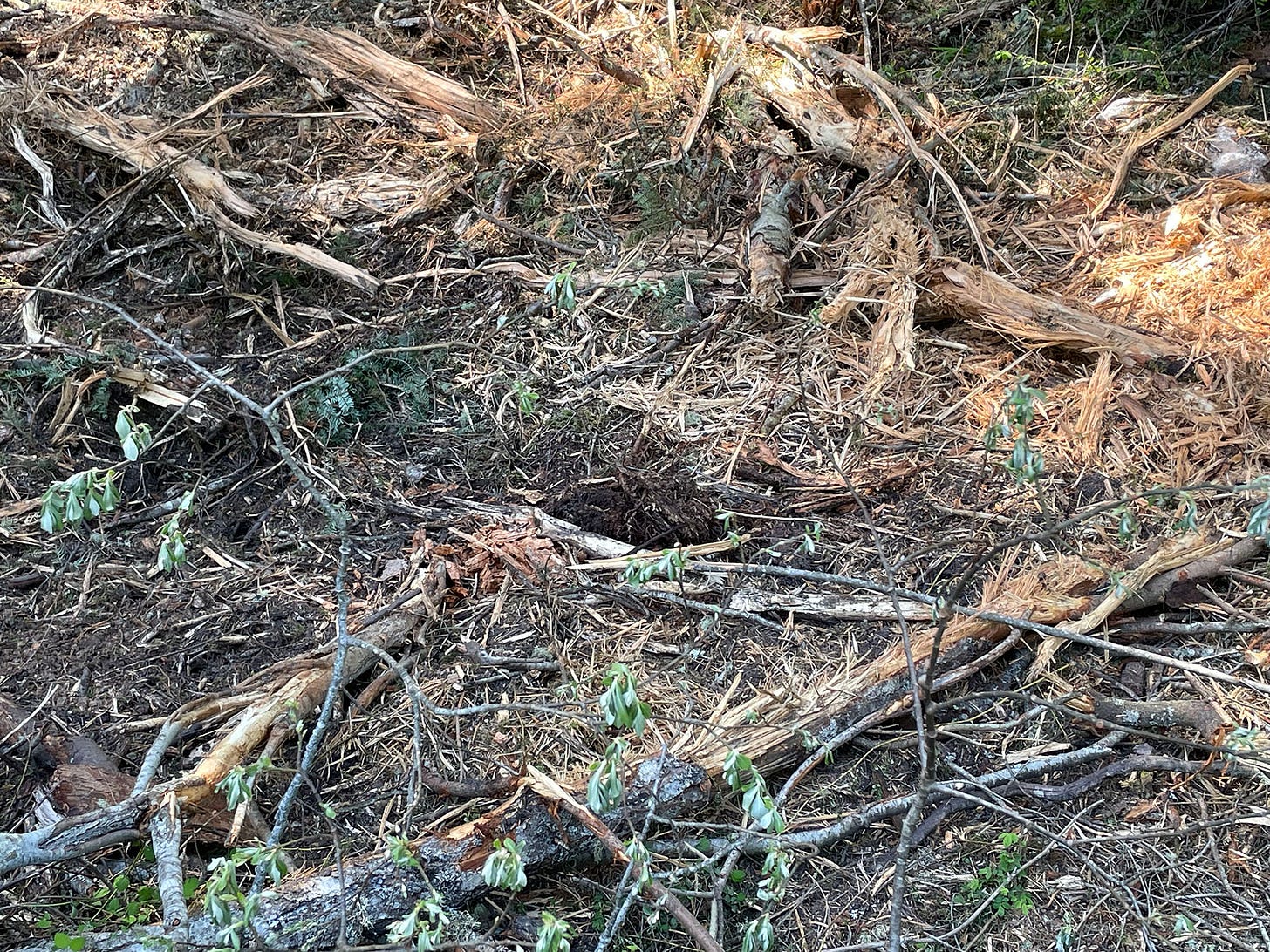For 13 long days, I have listened to bulldozers and brush hogs having their way with the land across the road from me, where almost 150 acres of “Designated Forest Land” (DFL) is being destroyed. Before two weeks ago, this land was mid-succession second growth, with a lovely mix of ocean spray, alder, fir, salal, oregon grape, ferns, moss, and more. Perfect nesting habitat in April and May for birds of all kinds, and home to more wildlife than I can imagine. I’ve seen frogs and newts make their way out of these woods in an attempt to cross the road for some unknown reason I cannot possibly fathom, perhaps drawn to territory they think might be better on the other side. Deer regularly disappear into the brush, knowing they are not safe along the road. Along with newts, frogs, snakes, birds, and insects of all kinds, the deer are now not safe in the woods either as the woods are rapidly disappearing.
After learning the land is DFL, I contacted the DNR person assigned to this area to find out if there are any laws in the books that might prevent logging, thinning, or brush clearing smack dab in the middle of nesting season. The answer: No. Unless there are one of the two endangered species nesting in the area (Spotted Owl and Marbled Murrelet) nothing can stop the total destruction of nesting areas. Not even the Migratory Bird Treaty Act protects birds during nesting season; the law protects only certain species, and only for direct “takes” meaning killing, capturing, selling, trading, and transporting birds of those species without a permit. Completely destroying the homes of these birds (and likely many of the birds themselves, along with their nests and eggs and nestlings) with clearing and logging apparently doesn’t count as a “take”.
I was curious if there are laws in other countries protecting birds and their habitat during nesting season. In England and Wales, all wild birds, their young, nests and eggs are protected under the Wildlife & Countryside Act 1981. It’s an offense to damage or destroy the nest of any wild bird while it’s in use or being built, or destroy or remove any egg of any wild bird. We have no comparable laws here in the United States, which strikes me as criminal. Each morning as the machines start up, I scream silently to myself and cannot believe there is nothing that protects those who call this land home, particularly at this time of year.
I know that logging, thinning, and brush clearing take place all over the Pacific Northwest daily, year round, with many orders of magnitude more destruction than what is happening across the road from me. Yet it is different when it’s right here; its proximity makes it personal. This is land I have walked by, biked by, driven by countless times. I’ve peered through the budding leaves of the roadside ocean spray to look at the trees; I’ve picked up pounds of trash from the side of the road along the boundary twice a year on “clean up day”; I’ve listened to birds singing from these woods as I’ve walked by—birds like robins, warblers, towhees, and wrens; and I’ve gently placed newts taken from the middle of the road into the bushes by the woods hoping they’ll find their way to safety. I’ve never crossed the boundary—it is after all, private land—but I know those woods were home to myriad wildlife and that home is now gone, stolen for nothing more than a tax break.
How I long for the day when not just these machines, but all the machines across the world fall silent for the last time.
This is the new soundtrack for my days, at least until there is nothing left to destroy. I contemplated going to stand in front of the deadly machines, but I know I’d quickly be arrested, and the clearing would continue. The land “owner” is perfectly within their legal right to do what they are doing, and the laws of this land favor extraction above all else. Wishing that it were different doesn’t make it so.
So I listen to the sound of destruction from the confines of the land I call home, and revel in the beauty of the madrone tree blossoms and the swallows arcing across the sky as they vie for swallow boxes, and hope it will be over soon. At some point, death is a mercy when the torture has gone on long enough.




I am very sorry for the devastation, yet you and I, who conceivably live in structures made of wood on land that was once forest, are complicit, no?
Q: What's the difference between a developer and a conservationist?
A: A developer wants to build little houses in the woods. A conservationist already has their little house in the woods.
I'm not really meaning to attack you. I'm just pointing out that there are so many of us — and our numbers are still increasing — that we will continue to impact the "unspoiled" areas that we hold dear.
Until collapse ensues. Let it come quickly, while there are still wild areas left!
Beautifully said. Thank you. Until we learn to be more thoughtful of the impacts of our presence in the natural world our footprint will continue to indiscriminately squash things of beauty and value. You and I see a rich, complex, and beautifully-tuned forest ecosystem where the power company and its insurers see financial risk and loss or a real estate developer sees foregone profits. Nature (a very real entity) always loses out to money (a total fiction). In the Global Operating System, the Matrix (financial capital, human & cultural capital, social capital, and manufactured/built & intellectual property capital) always receives more consideration and attention than does natural capital. That’s why the Matrix is not sustainable.